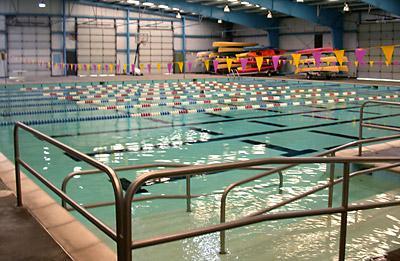Although the LSU athletic facilities exist and are available for students, many people do not realize they are not accessible to all students.
The Student Recreational Sports Complex is a fairly new building that might outwardly appear to adequately meet the needs of a student in a wheelchair. In front of the building, there are bright blue handicap signs and labels on the curb cuts and parking spaces.
An inclining path curves in a circular direction to allow wheelchairs to bypass the steps. Once in front of the doors, however, there are no electronic buttons for handicap accessibility.
Associate Director of Operations Mike Giles says the building is handicap accessible; however, he does admit there is room for improvement and hopes to obtain that through LSU’s Master Plan.
“The doors should be wheelchair-accessible,” he said. “We do what we can. It is not as accessible as it needs to be, but we are currently working on that.”
Despite the hardships, students with disabilities have attempted to use the Rec.
Although Giles said the Rec’s pool could be more handicap-accessible, he said LSU has a Special Olympics pool where most of the special needs and special activities are handled.
The Special Olympics pool is located across Nicholson Drive from the main area of campus, next to the Indoor Football Facility.
The building exists for students and visitors with special needs. According to aquatics graduate assistant Jacqui Lothian, the building serves kinesiology students, the Council on Aging, special needs groups and aerobics classes.
It even is used for birthday parties for a fee of $75. Several local schools take their students with disabilities to the LSU Special Olympics pool once a week, including Mohican Elementary, Denham Springs Elementary, McKinley and Greensburo.
“Most of the kids that come are autistic,” Lothian said, “but the pool also is accessible for wheelchairs.” The pool contains a ramp used for wheelchairs and only goes as deep as five feet.
However, the Special Olympics pool building is not handicap-accessible. Although students can make their way in and out of the pool, the bathrooms need work.
The handicapped stall in the women’s bathroom does not contain the proper railing, and the showers are not handicap-accessible at all.
According to Lothian, however, nobody has complained. “I think that the groups that come are so grateful that there are ramps to get into the pool that they are satisfied,” she said.
Although the bathrooms are not accessible in the Special Olympics Pool, it is a pretty far cry from the Huey P. Long Fieldhouse pool, where nothing is handicap-accessible.
Built in 1930, it is the only outdoor pool on campus and is not required by ADA to make renovations, as it is a historical building.
The entrance is too small; furthermore, once in the pool house, there is no other option than to walk down a few stairs to get anywhere in the room. The pool consists of three to 12 elevators to get to the old deck, and a trip to the bathroom cannot even be attempted for anyone in a wheelchair.
To get into the women’s bathroom, one must go up a step. If a wheelchair could fit in the door of the men’s bathroom, its operator would be faced with the choice of climbing 10 steps to get to a stall or attempting an impossibly sharp turn into a tiny stall to the left.
The bathrooms are a problem at the University’s track and field fieldhouse also. In this building, there is no elevator leading to the second floor, which contains the weight room’s lockers, an office and a classroom.
It is here the national senior Olympics indoor track facility meets and practices. This building also is used for student registration and parking and is open to LSU community every day.
Although LSU’s facilities are not completely handicap-accessible, the University does host the state and national Special Olympics competition.
According to Special Olympics Director of Sports and Competitions Susan McDormitt, the organization uses the Rec Center, the Agricultural Center and the Equestrian Center. She had no complaints regarding the University’s facilities.
“We’ve never experienced any problems,” she said, “but if we tried to do more in the Agricultural Center, we would have a few problems with the uneven floor.”
The Office of Disability Services seems to have the same belief about students not having problems. Director of Disability Services Benjamin Cornwell does believe that the campus is in serious need of renovation; however, he has not heard any complaints about the athletic facilities. “I really don’t have any feedback from disabled students using the athletic facilities,” he said.
Rec planning improvements
November 21, 2002

Rec planning improvements



